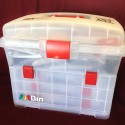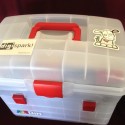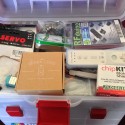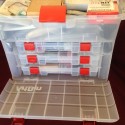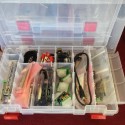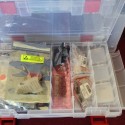Refills is a lightweight framework with SASS mixins, grids, and common web page design patterns.
My Electronics Kit
Since I rekindled my electronics hobby last year, I’ve accumulated a lot of new stuff. Arduino compatible boards and shields (Digispark, DigiX), a Raspberry Pi, lots of components and sensors, LED strips, power supplies, a new soldering iron, etc. Due to a lack of a real workspace (maybe one day I can clear out the garage workbench), a lot of this stuff was accumulating in boxes, bags, and padded shipping envelopes on our bedroom floor.
My wife, Susan, had suggested getting some sort of portable storage container, and one day we found this ArtBin cake decorating box (aff link) on clearance at the craft store. It’s actually designed for holding cake decorating supplies. But it works pretty well for my needs. It has a top compartment that’s about 4 inches deep, and three separate pull-out containers, with divided sections.
I probably need to get a couple more of these to hold the rest of my stuff, but at least this is a start. In the end, I’ll probably wind up shuffling things around a bit. I’ll probably try to group things together at least a little more logically, like putting microcontrollers together, sensors together, passives, support ICs, power modules, etc.
And I definitely need more stickers to go on here. Actually, there was a Dangerous Prototypes sticker, but it seems to have fallen off.
Ooh, a gladiator!
Dougal Campbell
March 20, 2014
As of 7:50 a.m. this morning, My wife Susan and I are officially grandparents. We will henceforth be known as Mammaw and Pawpaw.
Welcome, Carson Alexander Buckner. 9lbs 10oz, 20 3/4 inches. And congrats to proud parents Mary and Shane!
Pictures to come. Lots and lots and lots of pictures, I’m sure. 😉

Pantheon Platform Adds WordPress Support
Pantheon, long known as a platform provider for Drupal hosting, has now added official support for WordPress, as well. Pantheon provides a scalable web platform with devops-friendly dashboards and tools for deployment and management.
The first and most obvious thing we did was ensure the platform was WordPress-friendly. This is the only piece of work that wasn’t on our roadmap already, but luckily it wasn’t very hard. The requirements for running Drupal vs. WordPress are quite similar.
The upside is that WordPress developers can expect tuned and friendly configurations for php, nginx, Varnish, mysql and Redis, with a stock set of Plugins to make the most of everything the platform has to offer.
Interestingly, Pantheon already had a CLI (Command-Line Interface) tool called Terminus for managing services, which they originally implemented as a drush extension (drush is the “drupal shell”, a CLI for Drupal). In modifying their platform for WordPress support, they rewrote it as a stand-alone tool, borrowing a lot of ideas from wp-cli in the process.
We actually borrowed quite a lot from the wp-cli toolkit in this refactor. Our library code was largely portable from Drush, but we took their object structure and docstring-parsing magic, which is pretty strong stuff. As a result, we have a more robust CLI tool to build off in the future.
If you’re interested, they offer a free account to let you check things out (no custom domain on the free level). Paid offerings begin at just $25/month.
(I have no affiliation with Pantheon, if anyone is wondering)
These sources of completely free-for-use images are better than I expected. /ht wptavern.com
Well, *this* might be dangerous to our pocketbook. It might be a good thing that our house doesn’t have room for a whole lot of extra stuff right now…
Spacebrew allows you to connect multiple client nodes via websockets to create realtime interactions. There are libraries available for connecting Arduino/Processing devices.
This could be useful for APIs where generating data is expensive, but consuming the data must happen quickly.
mysql vs mysqli in WordPress
I recently ran across an issue that I was previously unaware of, so other developers could run into it as well. I was having problems with a plugin, which started misbehaving. The plugin had previously worked fine (it generates a sidebar widget), and I wasn’t actively working on my site, so I wasn’t really sure when it had quit working.
In the course of debugging the problem, I discovered that the plugin was throwing warnings in my PHP error log regarding the mysql_real_escape_string() function. As a quick fix, I simply replaced all of those calls with WordPress’ esc_sql() function. Voila, problem fixed.
Curious, I took a peek into wp-db.php, and found this block of code:
/* Use ext/mysqli if it exists and:
* - USE_EXT_MYSQL is defined as false, or
* - We are a development version of WordPress, or
* - We are running PHP 5.5 or greater, or
* - ext/mysql is not loaded.
*/
if ( function_exists( 'mysqli_connect' ) ) {
if ( defined( 'USE_EXT_MYSQL' ) ) {
$this->use_mysqli = ! USE_EXT_MYSQL;
} elseif ( version_compare( phpversion(), '5.5', '>=' ) || ! function_exists( 'mysql_connect' ) ) {
$this->use_mysqli = true;
} elseif ( false !== strpos( $GLOBALS['wp_version'], '-' ) ) {
$this->use_mysqli = true;
}
}Note the bit about using a development version of WordPress. In my case, I’m running out of svn trunk, and my server has the mysqli extension installed, so wpdb chose to use it. That’s fine.
But this exposes the fact that some plugins use functions like mysql_real_escape_string() “in the raw”, so to speak, which depends on using PHP’s mysql extension, and not mysqli. WordPress provides convenience functions like esc_sql() and $wpdb->prepare() to help abstract details like this away and protect developers against environmental differences between servers.
Hopefully this will save somebody else out there some debugging time.
